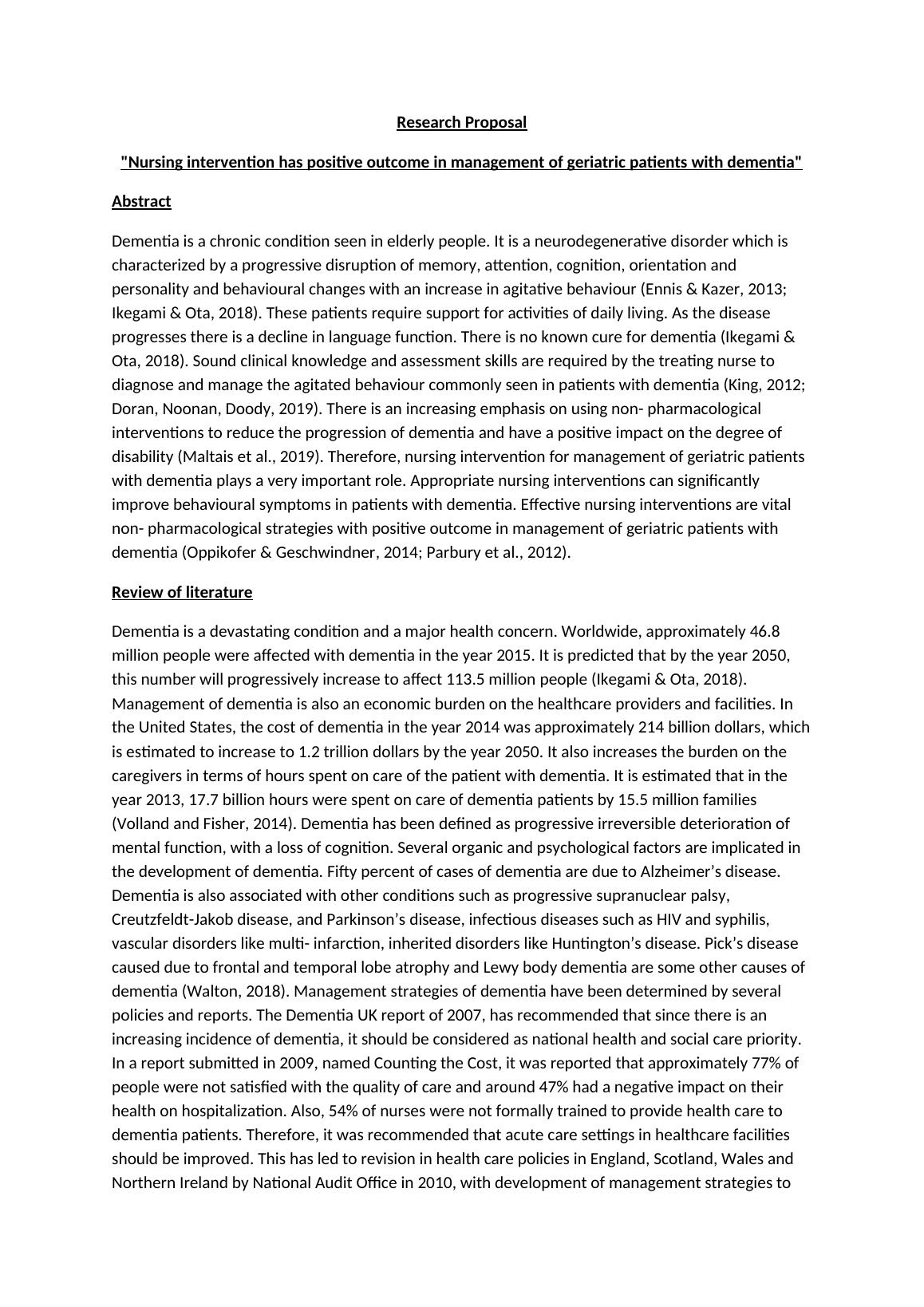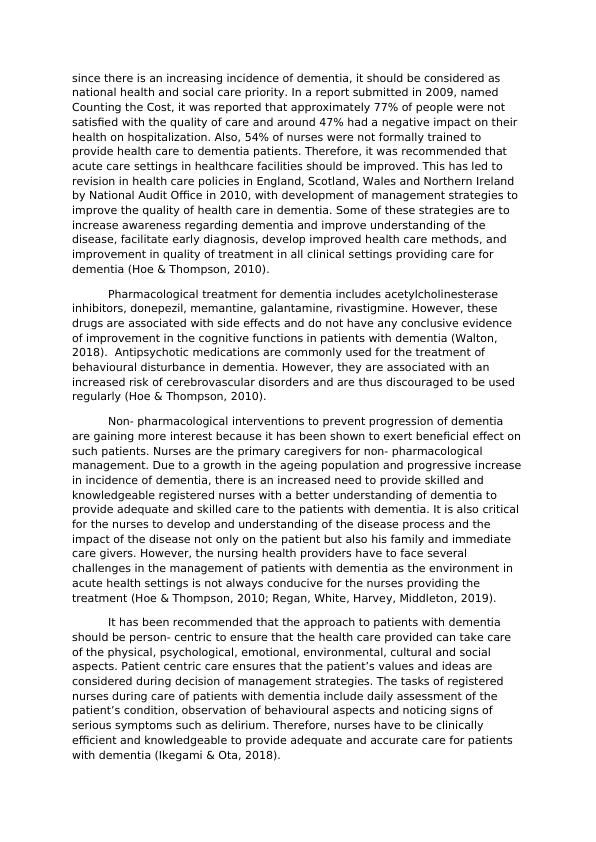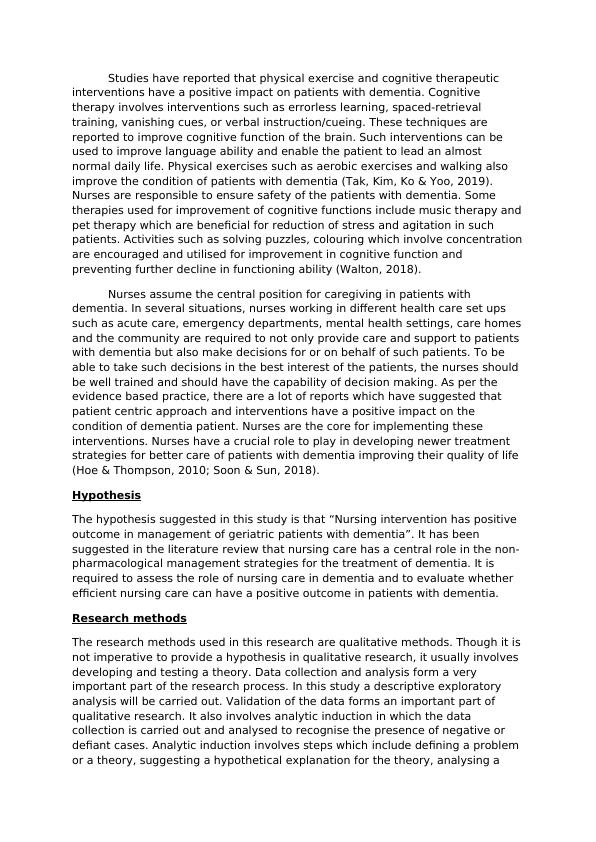Nursing Intervention in Geriatric Dementia Management
Added on 2023-01-12
8 Pages2979 Words42 Views
Research Proposal
"Nursing intervention has positive outcome in management of geriatric
patients with dementia"
Abstract
Dementia is a chronic condition seen in elderly people. It is a neurodegenerative
disorder which is characterized by a progressive disruption of memory, attention,
cognition, orientation and personality and behavioural changes with an increase
in agitative behaviour (Ennis & Kazer, 2013; Ikegami & Ota, 2018). These
patients require support for activities of daily living. As the disease progresses
there is a decline in language function. There is no known cure for dementia
(Ikegami & Ota, 2018). Sound clinical knowledge and assessment skills are
required by the treating nurse to diagnose and manage the agitated behaviour
commonly seen in patients with dementia (King, 2012; Doran, Noonan, Doody,
2019). There is an increasing emphasis on using non- pharmacological
interventions to reduce the progression of dementia and have a positive impact
on the degree of disability (Maltais et al., 2019). Therefore, nursing intervention
for management of geriatric patients with dementia plays a very important role.
Appropriate nursing interventions can significantly improve behavioural
symptoms in patients with dementia. Effective nursing interventions are vital
non- pharmacological strategies with positive outcome in management of
geriatric patients with dementia (Oppikofer & Geschwindner, 2014; Parbury et
al., 2012).
Review of literature
Dementia is a devastating condition and a major health concern. Worldwide,
approximately 46.8 million people were affected with dementia in the year 2015.
It is predicted that by the year 2050, this number will progressively increase to
affect 113.5 million people (Ikegami & Ota, 2018). Management of dementia is
also an economic burden on the healthcare providers and facilities. In the United
States, the cost of dementia in the year 2014 was approximately 214 billion
dollars, which is estimated to increase to 1.2 trillion dollars by the year 2050. It
also increases the burden on the caregivers in terms of hours spent on care of
the patient with dementia. It is estimated that in the year 2013, 17.7 billion
hours were spent on care of dementia patients by 15.5 million families (Volland
and Fisher, 2014). Dementia has been defined as progressive irreversible
deterioration of mental function, with a loss of cognition. Several organic and
psychological factors are implicated in the development of dementia. Fifty
percent of cases of dementia are due to Alzheimer’s disease. Dementia is also
associated with other conditions such as progressive supranuclear palsy,
Creutzfeldt-Jakob disease, and Parkinson’s disease, infectious diseases such as
HIV and syphilis, vascular disorders like multi- infarction, inherited disorders like
Huntington’s disease. Pick’s disease caused due to frontal and temporal lobe
atrophy and Lewy body dementia are some other causes of dementia (Walton,
2018). Management strategies of dementia have been determined by several
policies and reports. The Dementia UK report of 2007, has recommended that
"Nursing intervention has positive outcome in management of geriatric
patients with dementia"
Abstract
Dementia is a chronic condition seen in elderly people. It is a neurodegenerative
disorder which is characterized by a progressive disruption of memory, attention,
cognition, orientation and personality and behavioural changes with an increase
in agitative behaviour (Ennis & Kazer, 2013; Ikegami & Ota, 2018). These
patients require support for activities of daily living. As the disease progresses
there is a decline in language function. There is no known cure for dementia
(Ikegami & Ota, 2018). Sound clinical knowledge and assessment skills are
required by the treating nurse to diagnose and manage the agitated behaviour
commonly seen in patients with dementia (King, 2012; Doran, Noonan, Doody,
2019). There is an increasing emphasis on using non- pharmacological
interventions to reduce the progression of dementia and have a positive impact
on the degree of disability (Maltais et al., 2019). Therefore, nursing intervention
for management of geriatric patients with dementia plays a very important role.
Appropriate nursing interventions can significantly improve behavioural
symptoms in patients with dementia. Effective nursing interventions are vital
non- pharmacological strategies with positive outcome in management of
geriatric patients with dementia (Oppikofer & Geschwindner, 2014; Parbury et
al., 2012).
Review of literature
Dementia is a devastating condition and a major health concern. Worldwide,
approximately 46.8 million people were affected with dementia in the year 2015.
It is predicted that by the year 2050, this number will progressively increase to
affect 113.5 million people (Ikegami & Ota, 2018). Management of dementia is
also an economic burden on the healthcare providers and facilities. In the United
States, the cost of dementia in the year 2014 was approximately 214 billion
dollars, which is estimated to increase to 1.2 trillion dollars by the year 2050. It
also increases the burden on the caregivers in terms of hours spent on care of
the patient with dementia. It is estimated that in the year 2013, 17.7 billion
hours were spent on care of dementia patients by 15.5 million families (Volland
and Fisher, 2014). Dementia has been defined as progressive irreversible
deterioration of mental function, with a loss of cognition. Several organic and
psychological factors are implicated in the development of dementia. Fifty
percent of cases of dementia are due to Alzheimer’s disease. Dementia is also
associated with other conditions such as progressive supranuclear palsy,
Creutzfeldt-Jakob disease, and Parkinson’s disease, infectious diseases such as
HIV and syphilis, vascular disorders like multi- infarction, inherited disorders like
Huntington’s disease. Pick’s disease caused due to frontal and temporal lobe
atrophy and Lewy body dementia are some other causes of dementia (Walton,
2018). Management strategies of dementia have been determined by several
policies and reports. The Dementia UK report of 2007, has recommended that

since there is an increasing incidence of dementia, it should be considered as
national health and social care priority. In a report submitted in 2009, named
Counting the Cost, it was reported that approximately 77% of people were not
satisfied with the quality of care and around 47% had a negative impact on their
health on hospitalization. Also, 54% of nurses were not formally trained to
provide health care to dementia patients. Therefore, it was recommended that
acute care settings in healthcare facilities should be improved. This has led to
revision in health care policies in England, Scotland, Wales and Northern Ireland
by National Audit Office in 2010, with development of management strategies to
improve the quality of health care in dementia. Some of these strategies are to
increase awareness regarding dementia and improve understanding of the
disease, facilitate early diagnosis, develop improved health care methods, and
improvement in quality of treatment in all clinical settings providing care for
dementia (Hoe & Thompson, 2010).
Pharmacological treatment for dementia includes acetylcholinesterase
inhibitors, donepezil, memantine, galantamine, rivastigmine. However, these
drugs are associated with side effects and do not have any conclusive evidence
of improvement in the cognitive functions in patients with dementia (Walton,
2018). Antipsychotic medications are commonly used for the treatment of
behavioural disturbance in dementia. However, they are associated with an
increased risk of cerebrovascular disorders and are thus discouraged to be used
regularly (Hoe & Thompson, 2010).
Non- pharmacological interventions to prevent progression of dementia
are gaining more interest because it has been shown to exert beneficial effect on
such patients. Nurses are the primary caregivers for non- pharmacological
management. Due to a growth in the ageing population and progressive increase
in incidence of dementia, there is an increased need to provide skilled and
knowledgeable registered nurses with a better understanding of dementia to
provide adequate and skilled care to the patients with dementia. It is also critical
for the nurses to develop and understanding of the disease process and the
impact of the disease not only on the patient but also his family and immediate
care givers. However, the nursing health providers have to face several
challenges in the management of patients with dementia as the environment in
acute health settings is not always conducive for the nurses providing the
treatment (Hoe & Thompson, 2010; Regan, White, Harvey, Middleton, 2019).
It has been recommended that the approach to patients with dementia
should be person- centric to ensure that the health care provided can take care
of the physical, psychological, emotional, environmental, cultural and social
aspects. Patient centric care ensures that the patient’s values and ideas are
considered during decision of management strategies. The tasks of registered
nurses during care of patients with dementia include daily assessment of the
patient’s condition, observation of behavioural aspects and noticing signs of
serious symptoms such as delirium. Therefore, nurses have to be clinically
efficient and knowledgeable to provide adequate and accurate care for patients
with dementia (Ikegami & Ota, 2018).
national health and social care priority. In a report submitted in 2009, named
Counting the Cost, it was reported that approximately 77% of people were not
satisfied with the quality of care and around 47% had a negative impact on their
health on hospitalization. Also, 54% of nurses were not formally trained to
provide health care to dementia patients. Therefore, it was recommended that
acute care settings in healthcare facilities should be improved. This has led to
revision in health care policies in England, Scotland, Wales and Northern Ireland
by National Audit Office in 2010, with development of management strategies to
improve the quality of health care in dementia. Some of these strategies are to
increase awareness regarding dementia and improve understanding of the
disease, facilitate early diagnosis, develop improved health care methods, and
improvement in quality of treatment in all clinical settings providing care for
dementia (Hoe & Thompson, 2010).
Pharmacological treatment for dementia includes acetylcholinesterase
inhibitors, donepezil, memantine, galantamine, rivastigmine. However, these
drugs are associated with side effects and do not have any conclusive evidence
of improvement in the cognitive functions in patients with dementia (Walton,
2018). Antipsychotic medications are commonly used for the treatment of
behavioural disturbance in dementia. However, they are associated with an
increased risk of cerebrovascular disorders and are thus discouraged to be used
regularly (Hoe & Thompson, 2010).
Non- pharmacological interventions to prevent progression of dementia
are gaining more interest because it has been shown to exert beneficial effect on
such patients. Nurses are the primary caregivers for non- pharmacological
management. Due to a growth in the ageing population and progressive increase
in incidence of dementia, there is an increased need to provide skilled and
knowledgeable registered nurses with a better understanding of dementia to
provide adequate and skilled care to the patients with dementia. It is also critical
for the nurses to develop and understanding of the disease process and the
impact of the disease not only on the patient but also his family and immediate
care givers. However, the nursing health providers have to face several
challenges in the management of patients with dementia as the environment in
acute health settings is not always conducive for the nurses providing the
treatment (Hoe & Thompson, 2010; Regan, White, Harvey, Middleton, 2019).
It has been recommended that the approach to patients with dementia
should be person- centric to ensure that the health care provided can take care
of the physical, psychological, emotional, environmental, cultural and social
aspects. Patient centric care ensures that the patient’s values and ideas are
considered during decision of management strategies. The tasks of registered
nurses during care of patients with dementia include daily assessment of the
patient’s condition, observation of behavioural aspects and noticing signs of
serious symptoms such as delirium. Therefore, nurses have to be clinically
efficient and knowledgeable to provide adequate and accurate care for patients
with dementia (Ikegami & Ota, 2018).

Studies have reported that physical exercise and cognitive therapeutic
interventions have a positive impact on patients with dementia. Cognitive
therapy involves interventions such as errorless learning, spaced-retrieval
training, vanishing cues, or verbal instruction/cueing. These techniques are
reported to improve cognitive function of the brain. Such interventions can be
used to improve language ability and enable the patient to lead an almost
normal daily life. Physical exercises such as aerobic exercises and walking also
improve the condition of patients with dementia (Tak, Kim, Ko & Yoo, 2019).
Nurses are responsible to ensure safety of the patients with dementia. Some
therapies used for improvement of cognitive functions include music therapy and
pet therapy which are beneficial for reduction of stress and agitation in such
patients. Activities such as solving puzzles, colouring which involve concentration
are encouraged and utilised for improvement in cognitive function and
preventing further decline in functioning ability (Walton, 2018).
Nurses assume the central position for caregiving in patients with
dementia. In several situations, nurses working in different health care set ups
such as acute care, emergency departments, mental health settings, care homes
and the community are required to not only provide care and support to patients
with dementia but also make decisions for or on behalf of such patients. To be
able to take such decisions in the best interest of the patients, the nurses should
be well trained and should have the capability of decision making. As per the
evidence based practice, there are a lot of reports which have suggested that
patient centric approach and interventions have a positive impact on the
condition of dementia patient. Nurses are the core for implementing these
interventions. Nurses have a crucial role to play in developing newer treatment
strategies for better care of patients with dementia improving their quality of life
(Hoe & Thompson, 2010; Soon & Sun, 2018).
Hypothesis
The hypothesis suggested in this study is that “Nursing intervention has positive
outcome in management of geriatric patients with dementia”. It has been
suggested in the literature review that nursing care has a central role in the non-
pharmacological management strategies for the treatment of dementia. It is
required to assess the role of nursing care in dementia and to evaluate whether
efficient nursing care can have a positive outcome in patients with dementia.
Research methods
The research methods used in this research are qualitative methods. Though it is
not imperative to provide a hypothesis in qualitative research, it usually involves
developing and testing a theory. Data collection and analysis form a very
important part of the research process. In this study a descriptive exploratory
analysis will be carried out. Validation of the data forms an important part of
qualitative research. It also involves analytic induction in which the data
collection is carried out and analysed to recognise the presence of negative or
defiant cases. Analytic induction involves steps which include defining a problem
or a theory, suggesting a hypothetical explanation for the theory, analysing a
interventions have a positive impact on patients with dementia. Cognitive
therapy involves interventions such as errorless learning, spaced-retrieval
training, vanishing cues, or verbal instruction/cueing. These techniques are
reported to improve cognitive function of the brain. Such interventions can be
used to improve language ability and enable the patient to lead an almost
normal daily life. Physical exercises such as aerobic exercises and walking also
improve the condition of patients with dementia (Tak, Kim, Ko & Yoo, 2019).
Nurses are responsible to ensure safety of the patients with dementia. Some
therapies used for improvement of cognitive functions include music therapy and
pet therapy which are beneficial for reduction of stress and agitation in such
patients. Activities such as solving puzzles, colouring which involve concentration
are encouraged and utilised for improvement in cognitive function and
preventing further decline in functioning ability (Walton, 2018).
Nurses assume the central position for caregiving in patients with
dementia. In several situations, nurses working in different health care set ups
such as acute care, emergency departments, mental health settings, care homes
and the community are required to not only provide care and support to patients
with dementia but also make decisions for or on behalf of such patients. To be
able to take such decisions in the best interest of the patients, the nurses should
be well trained and should have the capability of decision making. As per the
evidence based practice, there are a lot of reports which have suggested that
patient centric approach and interventions have a positive impact on the
condition of dementia patient. Nurses are the core for implementing these
interventions. Nurses have a crucial role to play in developing newer treatment
strategies for better care of patients with dementia improving their quality of life
(Hoe & Thompson, 2010; Soon & Sun, 2018).
Hypothesis
The hypothesis suggested in this study is that “Nursing intervention has positive
outcome in management of geriatric patients with dementia”. It has been
suggested in the literature review that nursing care has a central role in the non-
pharmacological management strategies for the treatment of dementia. It is
required to assess the role of nursing care in dementia and to evaluate whether
efficient nursing care can have a positive outcome in patients with dementia.
Research methods
The research methods used in this research are qualitative methods. Though it is
not imperative to provide a hypothesis in qualitative research, it usually involves
developing and testing a theory. Data collection and analysis form a very
important part of the research process. In this study a descriptive exploratory
analysis will be carried out. Validation of the data forms an important part of
qualitative research. It also involves analytic induction in which the data
collection is carried out and analysed to recognise the presence of negative or
defiant cases. Analytic induction involves steps which include defining a problem
or a theory, suggesting a hypothetical explanation for the theory, analysing a

End of preview
Want to access all the pages? Upload your documents or become a member.
Related Documents
Nursing Essay in Dementia: Evidence Based Practice and Caregiver Managementlg...
|8
|2518
|346
Critical Analysis on Management of BPSD in Acute Psychiatrylg...
|13
|4598
|45
The impact of music therapy on wellbeing of dementia patientslg...
|12
|2931
|182
Mental Health Services for the Elderly Suffering with Dementialg...
|38
|11806
|134
Nursing leadership assignment samplelg...
|5
|801
|55
A Review on Effective Interventions for Managing Behaviours of Dementia Patients Admitted in Acute Care Settinglg...
|12
|3614
|229
